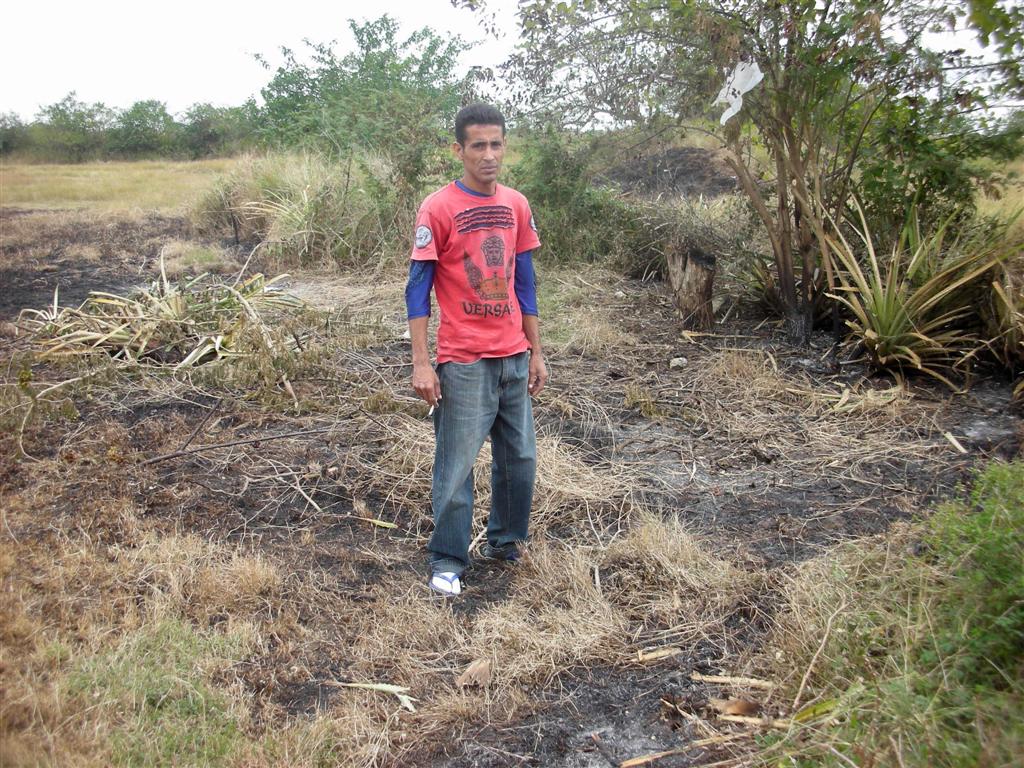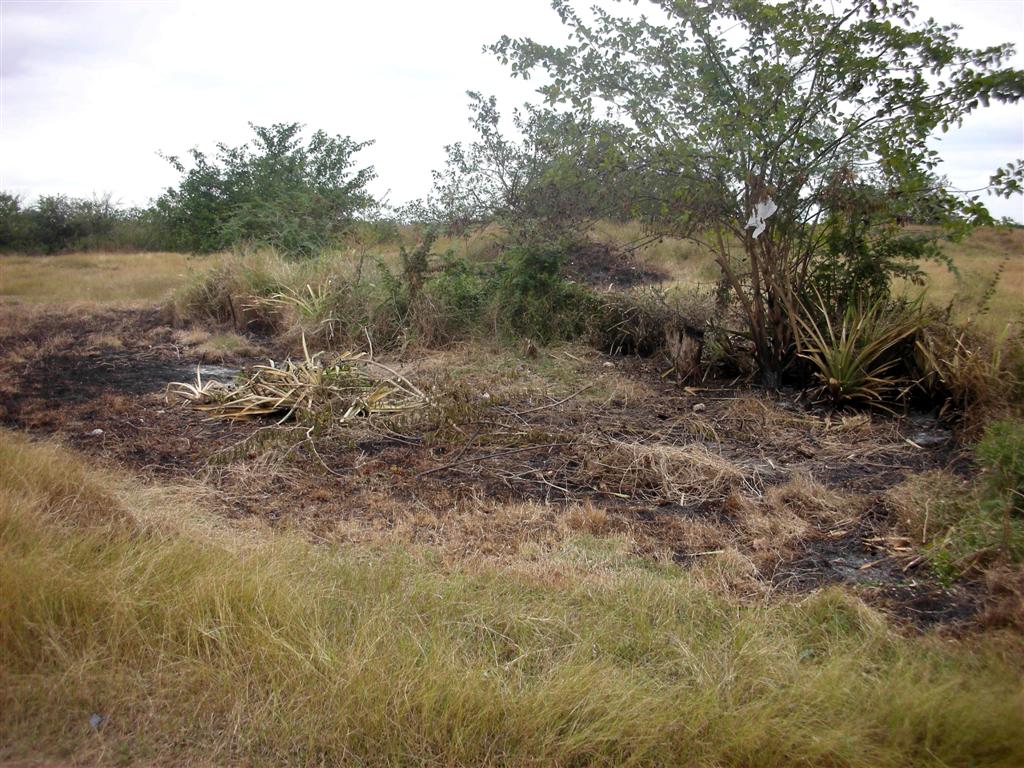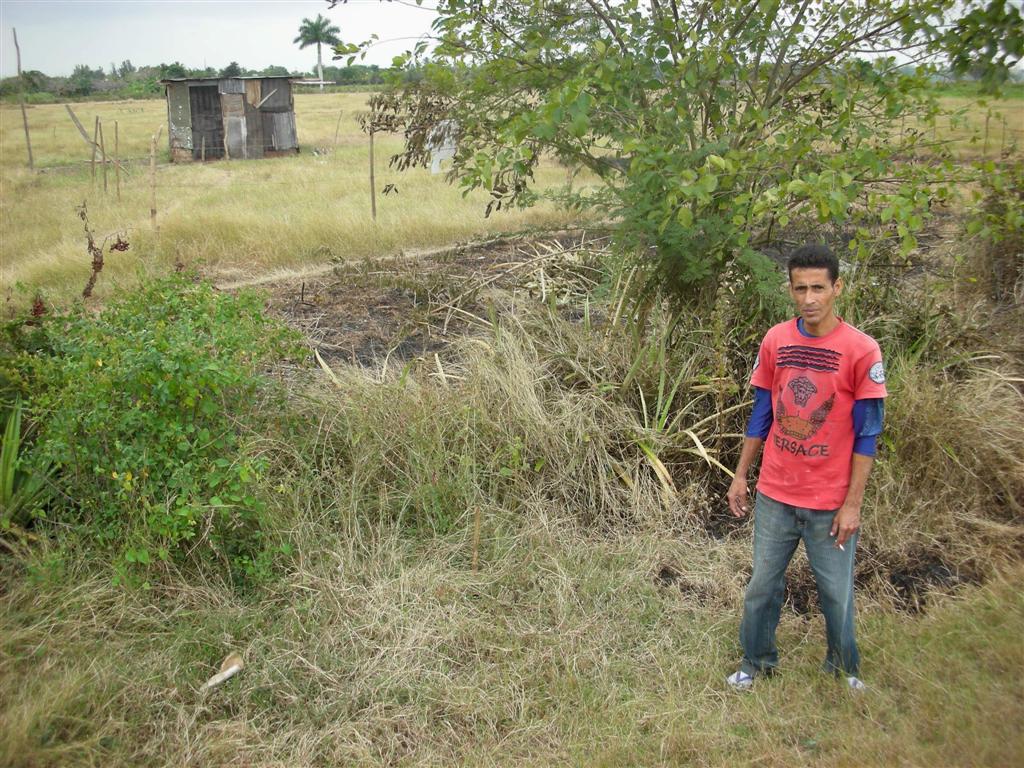
It could pass for a joke in bad taste. It could pass for the invention of a playful spirit. Unfortunately, horribly unfortunately, it is neither: The place where the 34-year-old young man named Alexander Otero is standing in these photos is nothing more nor less than the ground that the People’s Housing Authority in Granma province gave him on which to build his home. Look closely. It’s worth analyzing this depressing and cruel image.
This is about the pater familias whose desperate action — planting a den of shame in the middle of the city of Bayamo to call attention to his case — was reported in his blog, in the previous entry. I promised to continue the story, as some readers requested, following the practice of serious journalism and its demanding readers.This is the required continuation.

“The day after I spent the night in that makeshift hut with my wife and baby, the leaders of the government and the Housing Authority came to see me with the paper signed, sealed and delivered. They gave me the authorization to build on the land they assigned to me, with the condition that I immediately dismantle the shack which, they said, was creating political chaos among the population.”
For a man who spent 11 years waiting for a simple rectangular space, a fragment of ground to erect his poor dwelling, such a proposition was the light at the end of the tunnel.
“First they took my wife and baby, and took them to her father’s house, temporarily, they said, and they summoned me in the afternoon to officially show me the area where I could build a house for me and my family.”
When, hours later, an official followed orders to take him to the far outskirts of the city, in a semi-depopulated area of open fields, and showed him, “this was the place that had been assigned, Alexander Otero thought, essentially, that is was some kind of macabre joke.
“I felt an indignation that I can’t describe,” he told me in a voice filled with anger. “It was humiliation. Look what they gave me to build a house for my son: a place where there is no running water, no electricity. Look what they gave me to make me agree that I could no longer say they wouldn’t let me build a house in my city.”

But the implied malice against the humble nonconformist could go even farther. Although it didn’t seem like it, they could do even more.
“That same Friday afternoon, and I am here on the ground, looking at the outrage committed me and thinking what the hell was going to do with this, came a police patrol and took me prisoner without any explanation. ”
I listen and I think I can confirm his version: that same Friday I had agreed to meet with him a second time to see with my own eyes — and the lens of my camera — the site our officials had reserved for him. I waited a long time in my house and he never showed up.
“I was imprisoned for seventy-two hours. As that is the legal time they can detain you, they put me behind bars and exactly ten minutes before the end of precisely three days they took me out and levied a thirty peso fine for public disorder. So that’s what they considered my action of raising the rafters in that other place and spending the night there with my family.
Alexander and I talked while standing among the weeds at three in the afternoon. All around us, only the whisper of the grass, distant horses, solitude. The only house in the whole place was a few meters from the site where this young man was supposed to erect his, taught me what would also be his home: an obvious complaint against the socialist paradise that I’ve been told, since I first opened my eyes, was my country. I think of the cold, the insects, I think of his baby, and feel an overwhelming shame for the house that — with enormous sacrifices — my parents managed to build for me thirty years ago.
I look at this pestilent place and can’t drive from my memory the image of the residential neighborhoods, the areas reserved for the military and party leaders in my area, with manicured gardens and spacious parking spaces, their solar panels for hot water, their savoir faire. For the incredulous: if there are not images of those house in this blog, it’s because it’s impossible. If I just took out my camera, it would be confiscated before I ever pressed the shutter. No one is allowed to take photos outside official residences.
I know that right now, while I am listening to this poor man talk, I’m lousy company, I would like to say have faith, fight for your rights, that one day there could be a better future for you and yours. I would like to wish him a Happy New Year. But the words won’t come. So we retrace our steps like zombies, searching blindly for the way back to town.
December 28, 2010
